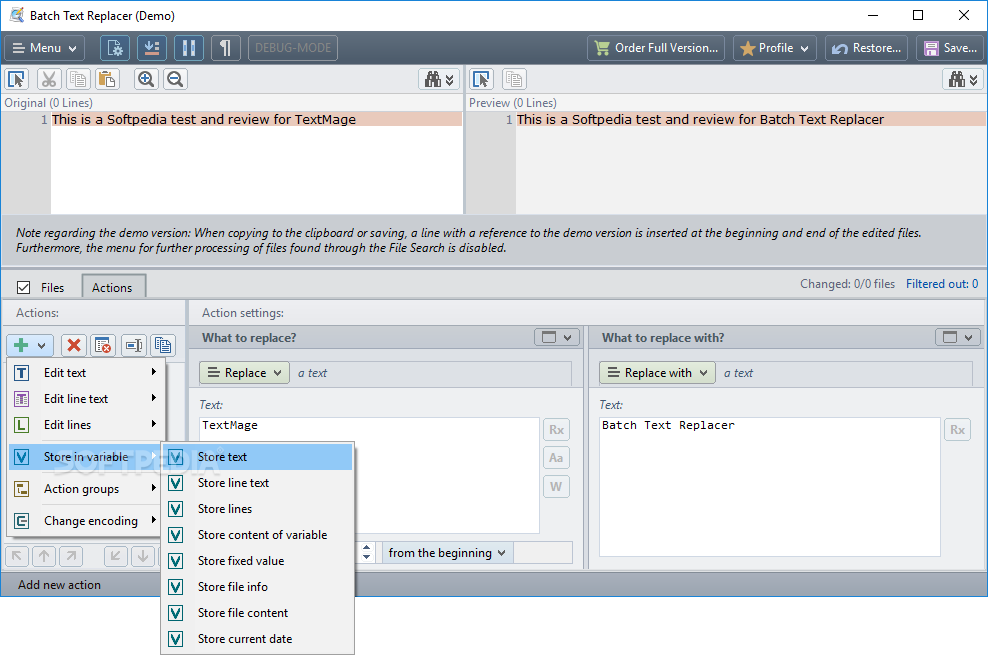

- #BULK FILENAME STRING REPLACER HOW TO#
- #BULK FILENAME STRING REPLACER FULL#
- #BULK FILENAME STRING REPLACER CODE#
And yes, it's a subset of the first line. The first replacment line with "OrangesApples" and "LemonPears" occurs just once at the beginning of the file, the 2nd replacment line with "Apples" and "Pears" occurs more frequently. So, if you work with hundreds of text files and you need to replace some text in them, Batch Replacer will do it for you in a second.

In the command, replace 'FILE-EXTENSION' with the extension to change and 'FILE-NAME'. On cmd line and with text to replace in front: for /f 'tokens1 delimst' a in ('dir /B test') do ren testb otherb this uses the last char of test to split the name (leading delims are ignored) In a batch. Type the following command to rename the files in bulk and press Enter: ren.
#BULK FILENAME STRING REPLACER FULL#
Now under Numbering (10), select Mode as Suffix > set Start as 1 > set at as 0 > set Incr. download total commander evaluation copy or buy full and use its built-in multi-renaming tool. Select or highlight all the files you need to rename under Name, and then under Name (2), select Fixed and type V (or any name). You can find all symbols in the file and replace them with anything. Open Bulk Rename Utility > select the files to rename. How do I make it run a start up, for both Win7 and Win10? Batch Replacer is created to solve this problem. Question 1: I've tried to make this script run at start up, with a batch file in the Startup folder, but somehow that doesn't work, it's only running if I execute it manually. The position modifier has to be specified between two \ at the start of the replace string. If that looks right, remove the n from the end and then it will do the actual renaming. To replace only the First, Last, Start, End, Second, Third, Fourth, Fifth, Sixth, Seventh, Eighth, Ninth match, use the position \modifier\, for example: Replace: \first\a - With: b - This will replace only the first a in the name with b. Set objFile = objFSO.OpenTextFile(FileOut, ForWriting) In a terminal, cd into the right directory and then run this. It utilises a flexible Regular Expression engine to enable you to create sophisticated searches, preview replace, perform batch operations, extract text. StrNewText = Replace(strText, "Apples", "Pears") StrNewText = Replace(strText, "OrangesApples", "LemonPears") Set objFile = objFSO.OpenTextFile(FileIn, ForReading) First, go to the folder where the file is located (e.g., “Files_To_Rename”) and click on the file path (see image below) It should look something like “C:\Users\erima96\Documents\Files_To_Rename”.Set objFSO = CreateObject("Scripting.FileSystemObject") If we use Windows, we can open up the File Explorer. That is, if we store our Python scripts (or Jupyter notebooks) in certain directories, we need to tell Python the complete path to the file we want to rename. About 3 strings need to be replaced with the filename excluding extension so it’s one string on 3 different lines, let’s say typelight which I need to change into the filename of each file. That is, step 1 is finding the location of the file we want to change the name on. All of the files have different filenames. Getting the File Path of the File we Want to Rename With Pythonįirst, to get Python to rename a file Python needs to know where the file is located.
#BULK FILENAME STRING REPLACER HOW TO#
In the renaming a file in Python examples below, we will learn how to carry on and changing names both in Linux and Windows. Currently i have the following (hope i outline it clear enough) The file names i wish to to change are: A3-12345iuiu.TXT A3-12365opop.TXT The desired result i want is A1 - 12345iuiu.TXT A1 - 12365opop. However, how we go about in the first step to rename a file in Python may differ depending on which OS we use. I wish to do it in batch, more than one file at a time.

Now, the general procedure is similar when we are using Linux or Windows.

In the first section, we are going to learn how to rename a single file in Python step-by-step.
#BULK FILENAME STRING REPLACER CODE#
Os.rename( 'python-rename-files.txt', 'renamed-file.txt') Code language: Python ( python ) 4 Simple Steps to Rename a File in Python


 0 kommentar(er)
0 kommentar(er)
